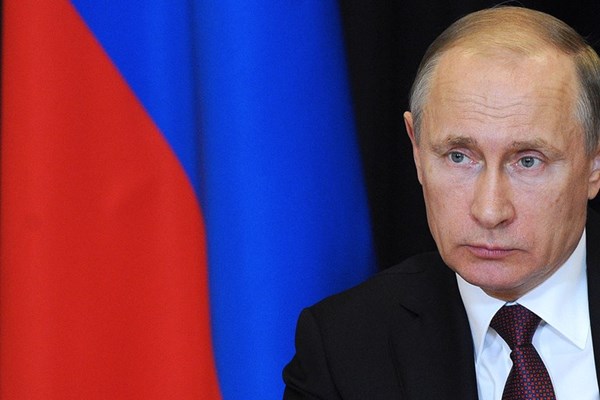Kremlin to rewrite Russian constitution to keep Putin in power
Russia’s senior leaders are continuing to prepare the population for an extensive revision of the constitution that will reshape the country’s institutes of government authority for the first time in 30 years.
The idea of changing the constitution, outlined in autumn last year by Constitutional Court Chairperson Valery Zorkin, was entrusted to State Duma Chairperson Vyacheslav Volodin to promote.
For the second time in half a year, Volodin, former deputy head of the presidential administration and author of the “no Putin – no Russia” doctrine, has called for the constitution to be “updated” and “adapted to modernity”.
In an article published in the Parliamentary Gazette on Wednesday, Volodin claims that constitutional reforms are necessary because the matrix of “concepts” which Russian society lives by has changed, especially the ideas of a dignified life and liberty.
The current constitution was adopted in 1993 “during an extremely severe and difficult time for the country”, he observes: “decent living conditions for a person and the opportunities for his free development now and 25 years ago – the content of these concepts is completely different”.
“Specific constitutional novations” are needed to change the “balance in the activity of the legislative and executive branches of government,” Volodin proposes.
The State Duma, in his opinion, needs more power to control the government, whose composition is currently determined exclusively by the prime minister, and even the president has no alternative to rely on.
“In this regard it would be correct, in my view, for the State Duma to at least participate in consultations when new members of government are appointed,” writes Volodin.
“The current approach fully corresponds to the widespread doctrine in global constitutional practice of a ‘living constitution’. The need to implement it in our country is constantly highlighted by Constitutional Court Chairperson Vladimir Zorkin,” he observes.
Zorkin proposed to correct the “liberal-individualistic approach to the understanding of law”, and replace it with “the ideas of sobornost (unity at the expense of individuality), universal unity, and universal humanity,” delineated in the works of the Russian philosophers of the 19th century.
“Attempts to impose on society perceptions of human dignity… can only be effective to an extremely limited extent,” he wrote in an article for Rossiyskaya Gazeta.
The ultimate goal of the constitutional reforms is to prolong President Vladimir Putin’s period in power, as his second consecutive term in office will end in 2024, sources in the Kremlin told Bloomberg.
In order to make this possible, one scenario that they are considering is to reallocate power, turning the president into a nominal figure with representative functions, and transferring true power to the prime minister.
Bloomberg’s sources did not say specifically that the prime minister will be appointed by the State Duma, but that the government would have complete control over parliament. In order to do this, the Duma needs to be given additional legitimacy, possibly by increasing the portion of deputies elected from single-mandate districts to 75%.
Another scenario would be to unite Russia and Belarus into one country, which Putin could lead. However, apart from the objections voiced by Belarusian President Alexander Lukashenko, Moscow is also afraid that the idea will not be accepted by Belarusian society.
The Kremlin’s official stance on constitutional reforms is slowly but surely moving towards approval.
In March 2018, Presidential Spokesperson Dmitry Peskov said that there is “not the slightest reason to think that Putin intends to adapt the constitution according to his personal political will”. In January 2019, Peskov said that the Kremlin has “no stance”. But on Wednesday, 17 July, he said that Volodin’s idea is worthy of discussion.
“This is the perspective of one of the members of the country’s senior leadership. For this reason, of course it is a topic for discussion,” Peskov remarked.
